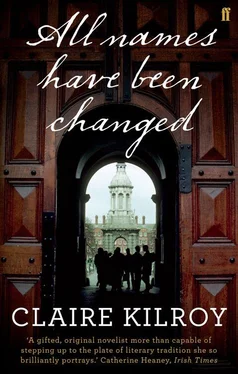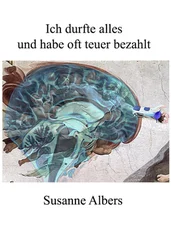Claire Kilroy - All Names Have Been Changed
Здесь есть возможность читать онлайн «Claire Kilroy - All Names Have Been Changed» весь текст электронной книги совершенно бесплатно (целиком полную версию без сокращений). В некоторых случаях можно слушать аудио, скачать через торрент в формате fb2 и присутствует краткое содержание. Год выпуска: 2010, Издательство: Faber & Faber, Жанр: Современная проза, на английском языке. Описание произведения, (предисловие) а так же отзывы посетителей доступны на портале библиотеки ЛибКат.
- Название:All Names Have Been Changed
- Автор:
- Издательство:Faber & Faber
- Жанр:
- Год:2010
- ISBN:нет данных
- Рейтинг книги:5 / 5. Голосов: 1
-
Избранное:Добавить в избранное
- Отзывы:
-
Ваша оценка:
- 100
- 1
- 2
- 3
- 4
- 5
All Names Have Been Changed: краткое содержание, описание и аннотация
Предлагаем к чтению аннотацию, описание, краткое содержание или предисловие (зависит от того, что написал сам автор книги «All Names Have Been Changed»). Если вы не нашли необходимую информацию о книге — напишите в комментариях, мы постараемся отыскать её.
All Names Have Been Changed — читать онлайн бесплатно полную книгу (весь текст) целиком
Ниже представлен текст книги, разбитый по страницам. Система сохранения места последней прочитанной страницы, позволяет с удобством читать онлайн бесплатно книгу «All Names Have Been Changed», без необходимости каждый раз заново искать на чём Вы остановились. Поставьте закладку, и сможете в любой момент перейти на страницу, на которой закончили чтение.
Интервал:
Закладка:
Glynn sighed impatiently and tapped his umbrella against his leg, urging it to giddy up and get him the hell out of there. He had a point: the lights were taking for ever to change. The country should have shown him more respect. The circumstances, it occurred to me then, were unrepeatable. I could not, even on paper, have devised a scenario more accommodating to our first conversation. It was the casual nature of the encounter that was most striking. Two men of the world briefly detained by a set of pedestrian lights. One man, the younger, leans in to extol the work of the elder, and the elder is pleased to hear that his work remains relevant to the next generation. These are his people, after all. This is his country, is it not? Glynn put himself on the line with The Ashtray Chronicle , exposed the darkest thoughts, the most pitiful weaknesses, the apparently boundlessly abject nature of man. It wasn’t much to ask of me to issue a sentence or two of gratitude in return for such uncompromising honesty. There was another fierce outbreak of shrieking amongst the gulls, their hysteria louder than the thundering traffic. Glynn swivelled his bloodshot eyes upward, swaying on his feet, and I winced at the stale reek of last night’s stout.
A lorry hurtled up the quays at a reckless speed, and the crowd back-stepped in alarm, jostling the two of us together. I turned to Glynn and cleared my throat to speak. His speculative appraisal of me hardened into an admonitory glare. How was I supposed to know that the anonymous poison-pen letters had recently put in their first appearance? Sometimes they were delivered through the postal system, but more often than not by hand, dropping through his letterbox at all hours of the day and night. One had even materialised in his coat pocket after a particularly punishing night out on the tiles.
Despite putting his back into it, deploying the formidable powers of observation at his disposal, Glynn never managed to catch the perpetrator in the act. Whoever penned the things was unnervingly conversant with his movements, appearing to know before even Glynn knew where he would be found. It was with great assiduity that they had studied their subject, displaying an eye for detail and a flair for dramatic timing rivalling that of the master himself. How intimate the two must have become, in a perverse way, brooding over each other like lovers all those long hours. Glynn had come to regard every dog and divil as their potential author, a man under siege from an assailant he couldn’t see. His tormentor could have been standing right next to him in the crowd at that very moment, for all he knew. Perhaps that explains why he shuddered.
A backdrop of swollen clouds was steadily rising behind him, an assassin creeping up to slit his throat. Clouds all but had minds in the fictions of Glynn. They were all but sentient. ‘The highwaymen of the sky,’ he had called them in The Devil’s Party , flattened in hiding on the horizon, ready to loom up and ambush you the second you came into range, as this one had done just now, all eighty foot of it. The chests of the gliding gulls looked so chalky white against its sodden greyness, and Glynn, he looked so small.
The pedestrian lights turned green and the crowd surged forward. Glynn headed back to the doghouse. He was living in a dank bedsit in a condemned building on Bachelors Walk by then, his wife having thrown him out the week before Christmas. Yet another fact I could never have inferred at the time. ‘Wait,’ I heard myself calling after him, but Glynn was already out of earshot, taking his retinue of screeching gulls with him. ‘Rain!’ they shrieked, ‘Rain!’ Fat drops burst on the pavement as the sky blackened. They fell tentatively at first, and then in a deluge, but still Glynn did not open his large umbrella, using it instead to strike a dustbin, then another, and so on up the quays, bang bang, bang bang , confirming an opinion I’d heard muttered in licensed premises the length and breadth of the country: that here was a fellow who did not know what was good for him, and who was unwilling to learn.
On the last bus home that night, I jotted down notes obliquely based on this thwarted encounter, my handwriting juddering across the page like a seismogram. I’d filled a copybook by the time I disembarked, and over the next four nights, before returning to the factory in Leeds, I fashioned a short prose piece. It was my first Chapter One, the first of my many Chapter Ones.
I termed it an excerpt from a novel in my application to Glynn for a place on his course, though there never was any novel. The piece was about, well, defeat, I suppose. Perhaps that’s what Glynn responded to when he read my few pages and added my name to the list alongside the names of the four girls — neither the imagery nor the characterisation, not the plot nor the language, but the all-pervasive tincture of failure. It must have struck a chord.
4 The Rocky Road to Dublin
Ten months later, I was back on the boat, this time going against the tide of panicked young Irish who were bailing off the island like rats off a sinking ship. Not me. I wanted to be there when that ship sank. I wanted to see it happen. It was the final week of September 1985.
The country I returned to was comprehensively and publicly on its knees. My teenage years had been dominated by news bulletins detailing which factories had closed and where, incurring how many job losses, how many new additions to the live register. Having in ’82 completed an engineering degree out of a sense of duty to my poor mother, a widow then of some seventeen years, God have mercy on my father’s soul, I left Ireland to work in a manufacturing plant in Leeds. We produced components for various domestic appliances. Vacuum cleaners, washing machines, irons, sandwich makers.
Through living an existence entirely temporary in nature, barely an existence at all by Glynn’s red-blooded, hot-headed criteria, I had saved enough money to keep myself — were I to continue living frugally — for a full academic year in Trinity. Like many witless young idealists, I was of the conviction that money was of no inherent value in itself. I was twenty-five years old. By that age, Glynn had already published a debut collection of short stories, one novel (the aforementioned Prussian Blue ) and what he described during the Royal Irish Academy public interview as ‘a few aul poems’, finding two syllables in the word ‘poem’, as, very soon, did we.
I spent altogether twelve days trawling the streets for a suitable bedsit, a search that proved more sobering than anticipated. Michelmas term had already commenced, so only the dregs were left by then, the dives every other student had rejected. The full extent of the neglect Dublin had suffered was revealed to me in a series of tableaux presented by bored landlords. They swung doors open onto scenes of dilapidation so grim that they didn’t even attempt to defend them. Those rooms told a story not just of a recession, but of a city — once the second of the British Empire, it is hard to credit — that had been in decline for the guts of two centuries.
The rooms were situated mainly in the grand Georgian terraces and squares built in the late eighteenth century. The sad deterioration of those gracious family residences was not a reflection on Ireland’s distaste for its colonial past but, rather, on the lack of resources available to bestow on those fine old buildings the specialist care they required. Whole rows, entire streets, had been broken down into the maximum amount of rental units for the minimum possible investment. I encountered rooms with broken windows, rooms with no windows, rooms that were sited partially underground, or in poorly converted attic spaces, shards of daylight piercing the rafters. Rooms that were split into smaller rooms by panels of sheet rock, floor areas not much larger than coffins. Rooms that stank of mildew or grew mushrooms in the corner. Rooms with ivy poking through cracks in the walls, floors squelching underfoot.
Читать дальшеИнтервал:
Закладка:
Похожие книги на «All Names Have Been Changed»
Представляем Вашему вниманию похожие книги на «All Names Have Been Changed» списком для выбора. Мы отобрали схожую по названию и смыслу литературу в надежде предоставить читателям больше вариантов отыскать новые, интересные, ещё непрочитанные произведения.
Обсуждение, отзывы о книге «All Names Have Been Changed» и просто собственные мнения читателей. Оставьте ваши комментарии, напишите, что Вы думаете о произведении, его смысле или главных героях. Укажите что конкретно понравилось, а что нет, и почему Вы так считаете.












